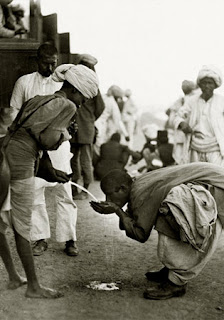
India is a land of many religions and numerous castes and is also called unified as a whole as far as the saying ‘unity is diversity’ goes. Religion is at the basis of the caste system prevalent in the country. Just as we divide ourselves on the basis of religion, in the same manner we do separate on terms of caste. A debate in ongoing whether we should have an enumeration of the castes in the country, but if such a calculation is then the caste problems would increase instead of decreasing, bringing chaos, when the numbers are revealed.
The Hindustan Times article that read “Development overrides caste in Bihar battle” is about the emergence of a new mode of campaigning based on assurance of development in the region. This was not the case few years back when the political leaders of Bihar still utilized the caste politics and were dependent on castes to vote for the respective leaders. This massive vote bank on which they used to depend is giving way to, according to the article, development.
I disagree with the above mentioned article because this may only be the case before elections in certain part of India and this will end as soon as the elections are over. The leaders will again come back to their caste biases and thus this will lead nowhere. However, this is a very positive sign of India going beyond the caste borders and concentrating on development to gather votes. Bihar could possibly set an example for the entire country to follow its footsteps. This caste system ahs gone into the roots of the people and in Bihar, people used to vote for their own caste people only. But reports say that the situation is fast changing, though people cannot be lured only with few development projects undertaken in the country.
Development, in other parts of the country has not disappeared or is not disappearing at a fast rate. The only thing can be that now people are taking initiatives to make it a point to drive it away and this will take time. The article in Hindustan Times does not hold good for other parts of the country too. The movie ‘India Untouched’ throws a flood of light on the issue of caste system and the discriminations practiced accordingly. The documentary begins with a stark example of how innocent young children have somehow got into their heads that if they get into a Dalit house they will get ‘polluted’. This is the effect our caste system can have on young minds, which are the easiest to mould. The documentary shows how Dalits in almost all parts of the country suffer the same fate of untouchability and segregation. They are the ones who suffer because of the cruel practices of the society.
The religious minds are not there to ward off this practice but they are the ones who support the system of caste discrimination. We find a Hindu pandit explaining, in India Untouched’, how God himself divided the people on the basis of the works they should perform, this is profounded by stating slokas from the Vedas.
At some places in Madurai and Tamil Nadu the Dalits are not even allowed to enter villages dwelled by upper castes with their shows on. They have to remove it and carry it by their hands. This is the level of humiliation these people are subjected to. Such cases of deprivation are there to stand with others like not letting the Dalits to draw water from the same well where other upper castes do. This may seem to be history to the educated masses, but this is the reality at the grass-root level in Indian villages. Lower caste people are derided and looked down upon and no social status is granted. We forget, at times, that we are all human beings and then only we are divided into castes, creeds and sects. Humanity should be the only factor taken into consideration and nothing else.
The issue of honor killings should also be brought to focus while speaking of caste and untouchability. The case of Tamil Nadu needs to be discussed where in the past two years 1,971 women have killed themselves and many among them could be honor deaths, according to a Tehelka study. The article in Tehelka shows how a 35-year-old Dalit man was killed by his non-Dalit wife’s brothers. Thus not only untouchability but such brutal practices can also be attributed to the stringent caste system in India.
If development had given way to caste system then there would have never been a rebellion to separate Telengana from the state of Andhra Pradesh. This is the most neglected area in the state and they have been living in such a condition for years. There have been very little amount of development compared to other parts of Andhra Pradesh, mainly the capital, Hyderabad. The people there are aggrieved about the biases in budget allocations, water and jobs available to them. The protests have shaken the roots of the government, till then, sitting cosy in their chairs and counting on them only for votes.
Thus development should override caste in India but this is not the case as presented in the above paragraphs. India then will be an utopia if any day development overpowers caste system and says that it is what matters. However though I disagree with the Hindustan Times article on Bihar, I would like to state that if such a thing is substantial and not only for vote gathering, then India is set to shine in the upcoming years with everyone enjoying the same amount if rights everywhere, irrespective of caste, creed, ect or sex.
My article on Media Hive


